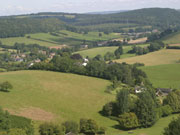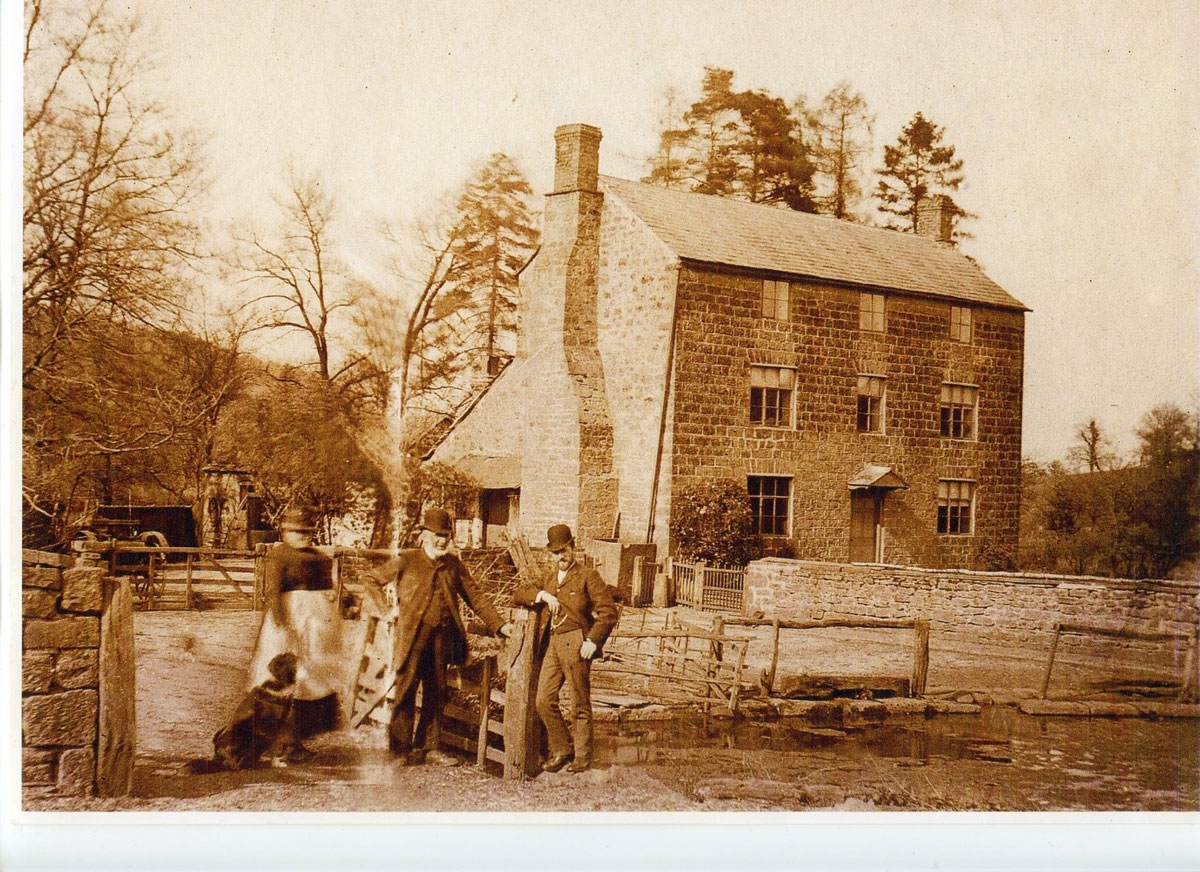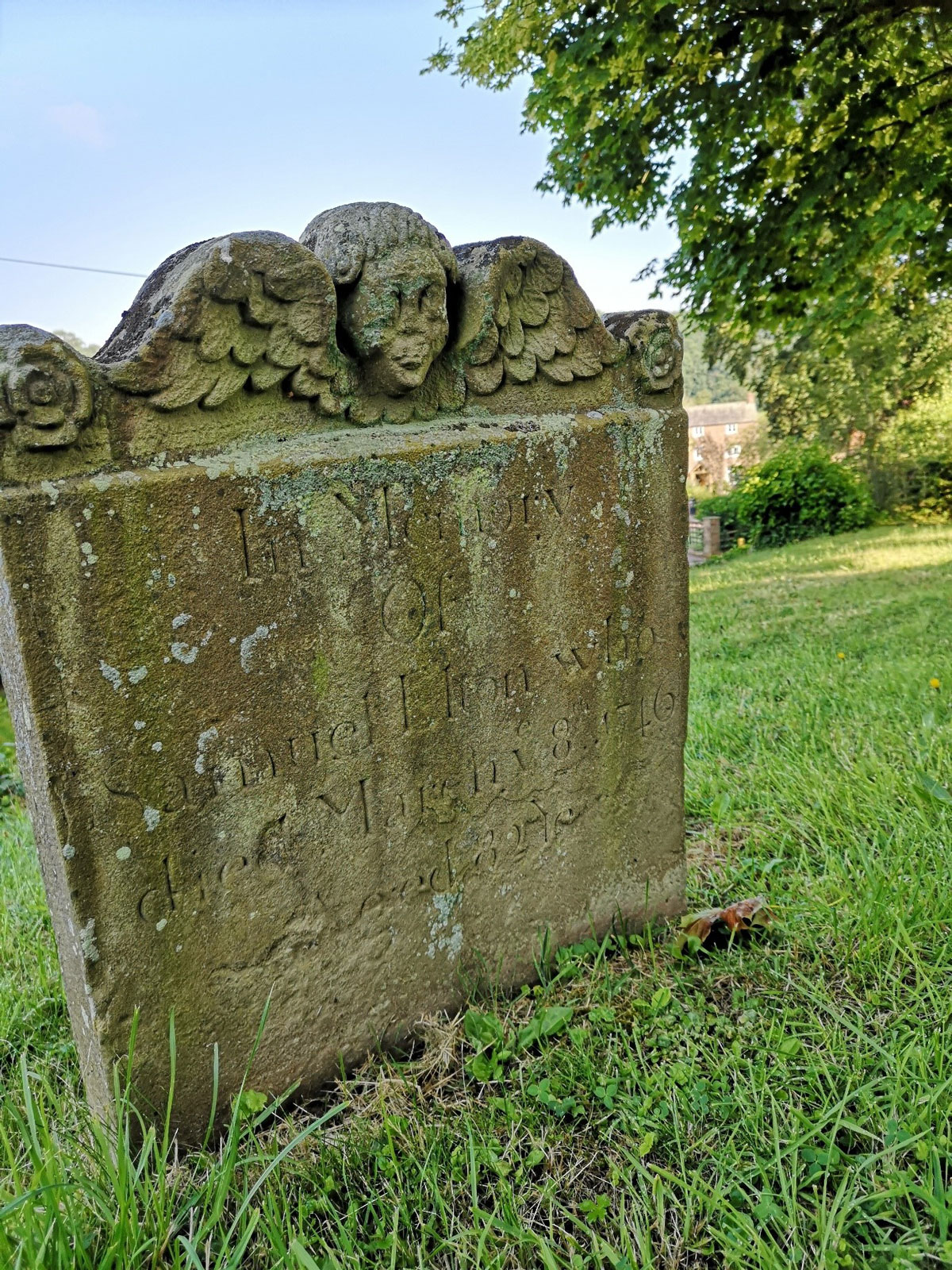 |
 |
 |
 |

Old Picture of Moat Farm - Ian Lewis from material provided by Ray and Cynthia Margrett
Some time ago, Ray Margrett at Moat Farm received a visitor enquiring about a family named Grindon who had lived on Moat Farm during the seventeenth and eighteenth centuries. Today's Grindons later sent copies of letters describing earlier visits, in 1801, 1909, and 1929, and they paint fascinating pictures of the times. In fact it looks like the Grindons would have been the first occupiers of the existing Moat Farm house.
The letters include notes of entries in the Parish records of Grindon burials in Hope Mansell in 1627 and 1679; and the letter of 1801 reports, "About 4 yards from the Church door of Hope Mansell your Grandfather William Grindon lies buried. He died July 23 aged 45 – 1733. Your uncle William Grindon he died August 2 aged 31 – 1761, Mrs Elton grandmother died March 8 1746. Mr Elton grandfather died March 10 aged 83 – 1746."
William Grindon's headstone might be the tall one near the path by the church door, where, sadly, the inscription has flaked off entirely. The Elton gravestones are still legible, near the west wall of the church.
The letter of 1929 notes, "The Eltons are of Saxon origin and are supposed to have come from Cheshire ... John Elton is included in the list of gentry in the county of Hereford taken by the Commissioners in 1433."
The Grindons moved to Bristol towards the end of the eighteenth century, but Eltons remained in the area for some time. Do readers know of Eltons still living in the area?
This is a letter written by T E Grindon, reporting his visit to Hope Mansell on Tuesday, December 28th, 1909. From Gloucester he travels to Mitcheldean Road Station, which he reaches at about 10.30 am. He continues:
I then made my way to Hope Mansell village which was about 3½ miles distant. After a brisk walk I reached the village which was situated in a pretty valley at the foot of high hills.
I easily found the Moat Farm and made myself known to the occupier, a farmer by the name of Bennets. When he learnt that my ancestors had formerly lived on the farm he was very interested and showed me around the place and asked me to lunch with him. I entered the house with mixed feelings of joy and sadness, for I was very glad to once more enter the former home of my forefathers and yet I felt sad that things have so altered, and that time had marked the place with a ruthless hand. The farmer and his wife were very kind and hospitable and I much enjoyed a good solid meal washed down with draughts of good home-made perry. The home-made cider was also very good. After having been shown round the old house which must have been between 200 and 300 years old, I was taken round the outbuildings which were all very old-fashioned and some were rather dilapidated. In the horses' stable there were no partitions and it looked a pretty sight to see the 5 horses there all together – and fine horses they were! One was not even tied up. The farmer did not think it necessary.
In the front of the house was a good-sized green lawn, and at the end of the lawn, a fair-sized green-leaved tree. The Bennets did not know the name of the tree and had not been able to discover it.
The house was a three-storeyed one. There were four large bedrooms and two small dressing rooms. The dining room was of a good size and the drawing room also. The house and outbuildings do not seem to have been altered at all from what I could gather from the Bennets. When the old Grindons inhabited it, it must have been in just about the same condition. It was formerly surrounded by a moat full of water. This is done away with now, but the farmer showed me where it had been. A pond is all that remains of it. The farm consists of 42 acres of land but the farmer rents much more land at some little distance off. The Grindons no doubt did the same.
The farm is situated in the middle of the village which constituted a few houses and a couple of farms. There were two or three orchards attached. There was a very ancient old cider press in one of the outbuildings. Just as was used in the Conqueror's time, I should imagine. Also a very ancient apparatus which a horse had to work and which was used for cutting corn etc.
The fireplace in the dining room was also very ancient. It possessed a thing called "a sway", which I have never seen in any other farm house. There was a cooking stove attached. In fact it was such a handsome piece of work altogether that I should think it must have cost a great deal of money for it certainly could not have been less than 100 years old at least.
The pin still remained in the mantelpiece so that one could roast a hanging joint of beef in front of the fire.
There was a very ancient old rustic labourer in the farm. He looked just as if he had come out of the ark. He had such a funny old 500-years-ago sort of face. He was a good and faithful old labourer, so Mr Bennets said. The farm belongs to Mr Street. His family have been associated with the parish at least as far back as the 17th century. For the last 50 years he had let it to the Bennets family and his father had farmed it himself before the now deceased Mr John Bennets. The present Mr Bennets, the tenant, was the nephew of the late tenant. He had never heard of the Grindons. Mr Street would be the man who would possess the old title deeds or something of the sort if the Grindons had owned the farm. The present Mr Street resides in Portishead.
The farm looked a very nice-looking, well-built sort of farm from the road, as it was, of course.
After cordially thanking the farmer for all his kindness I departed and made my way to the vicarage. I saw the Vicar and he showed me the old registers, and there could be seen the entries of births and deaths of the Grindons of former days. The vicar was a very kind and obliging man. Thus ended an enjoyable and pleasant excursion. I much enjoyed it all and was glad to gaze upon the home of my ancestors. The weather was mild and not very bright but that was not a great hardship.

Samuel Elton 1746 with Moat Farm in the background